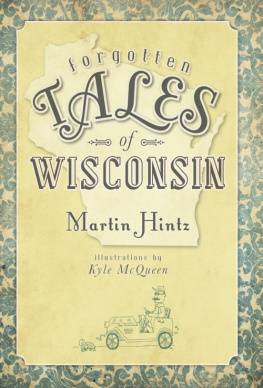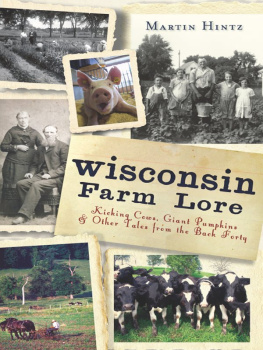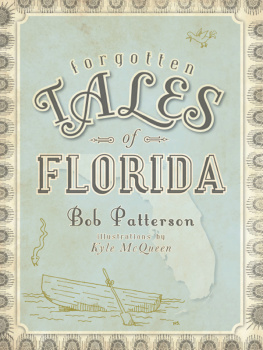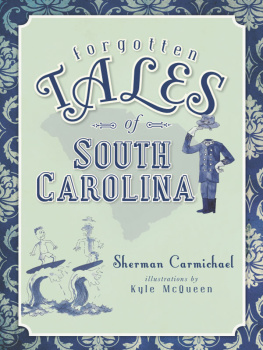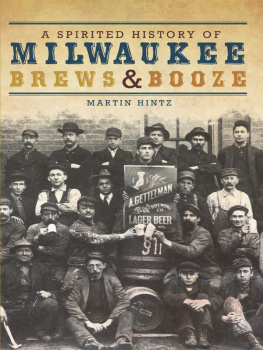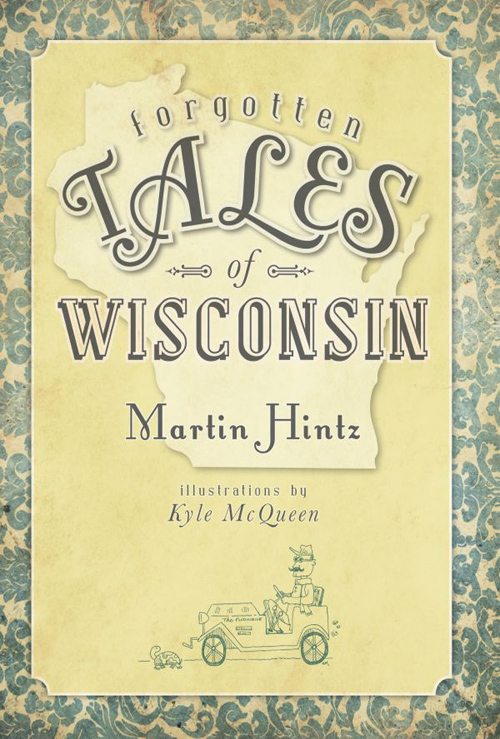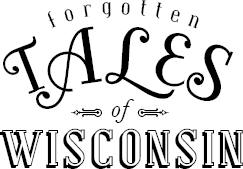

Published by The History Press
Charleston SC 29403
www.historypress.net
Copyright 2010 by Martin Hintz
All rights reserved
Illustrations by Kyle McQueen
First published 2010
e-book edition 2011
ISBN 978.1.61423.187.5
Library of Congress Cataloging-in-Publication Data
Hintz, Martin.
Forgotten tales of Wisconsin / Martin Hintz
p. cm.
Includes bibliographical references.
print edition ISBN 978-1-59629-872-9
1. Wisconsin--History--Anecdotes. 2. Wisconsin--Biography-
Anecdotes. I. Title.
F581.6.H56 2010
977.5--dc22
2010012636
Notice: The information in this book is true and complete to the best of our knowledge. It is offered without guarantee on the part of the author or The History Press. The author and The History Press disclaim all liability in connection with the use of this book.
All rights reserved. No part of this book may be reproduced or transmitted in any form whatsoever without prior written permission from the publisher except in the case of brief quotations embodied in critical articles and reviews.
PREFACE
There are more yarns to tell about Wisconsin than youd get counting out a bushel of monstrous Rhinelander hodags. These sharp-fanged creatures caused a North Woods panic before the hoax was revealed by a group of Rhinelander pranksters in the late 1890s.
This Forgotten Tales of Wisconsin anthology is truly a team project. Subsequently, Id like to thank all of those old-time newspaper and magazine publishers, editors and reporters who were on the front lines of history when they ran their stories generations ago; plus memoir writers and authors who transcribed the marvelous and the mundane; as well as the museums, the Wisconsin Historical Society and county and city historical organizations with their vast array of archives; genealogy fans, who lovingly research and catalogue the past; and ordinary folks who actually still have the capability to remember things.
Without this deep pool from which to draw facts and features, the tales found in this volume might remain untold and perhaps truly forgotten.
To anyone who loves cheese, badgers, the robin (state bird) and all things Wisconsin, please enjoy reading these anecdotes. Some are sad, some terrifying, some happy, some funhey, thats the stuff of Wisconsin history.
FORGOTTEN TALES OF WISCONSIN
GET THE LEAD OUT
Discovery of lead resulted in the creation of the Territory of Wisconsin, which included lands west of the Mississippi River to the Missouri River. The act creating the Territory of Wisconsin was signed on April 20, 1836, by President Andrew Jackson. Much of the western portion was later transferred to the Iowa Territory, created in 1838.
The town of Petosi along the Mississippi River became the hub of the lead mining industry and was one of the largest communities in the territory. As protection from the weather and robbers, miners regularly dug burrows into the sides of the bluff. A visitor remarked that the holes looked like they had been dug by badgers, hence Wisconsins nickname became the Badger State, according to a history of the state written by former governor George W. Peck in 1908.
CIRCUS STATE
Wisconsin has had a storied love affair with the circus. Mud showsthose that traveled overland via wagonswere commonplace in the state before the Civil War. A number of circuses settled in Wisconsin because of the excellent foraging and available fresh water for the animals, the skilled craft workers who made wagons and props and, best of all, the fact that it was a good place to raise kids. Eventually, more than one hundred shows made the state their home.
In 1847, Edmund and Jeremiah Mabie, owners of the U.S. Olympic Circus, moved to Delavan to establish their winter quarters. At the time, it was the largest circus in North America. This was one year before Wisconsin became a state and almost a quarter of a century before the Ringling Brothers made their hometown of Baraboo their base. The Mabies constructed their shops and stables on the shores of Delavan Lake, where todays Lake Lawn Resort is located. Other large circus families in town included the Hollands and the Buckleys.
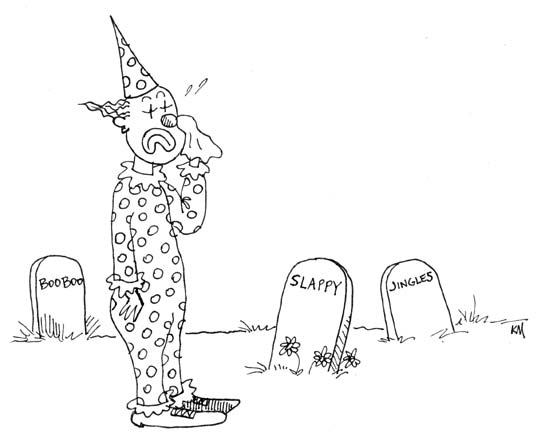
The town soon attracted more shows, with eventually some twenty-six circuses locating there. Among them were H. Buckley & Co.s National Circus and the Roman Hippodrome and Universal Fair. Yet one of the most famous was the P.T. Barnum Circus, founded in Delavan in 1871. Only a handful of retired performers and workers still lived in Delavan after the E.G. Holland Railroad Circus pulled up stakes in 1894. More than 150 clowns, entertainers, trainers and workers are buried at Delavans Spring Grove and St. Andrews Cemeteries.
PINK LEMONADE
Peter Conklin, an employee of Delavans Mabie Brothers Circus, ran a refreshment stand for the show in 1857 and is credited with inventing pink lemonade. During one rush by thirsty customers, Conklin grabbed a bucket of water in which an equestrienne had washed out her red tights. He tossed a couple of lemons into the pink-tinged water and sold the mixture as strawberry lemonade. Thus a new drink was born.
ITS DRAFTY HERE
Wisconsins residents were not totally in tune with the Norths involvement in the Civil War. Many immigrants, fed up with soldiering back in the Old Country, objected to the draft that President Abraham Lincoln instituted in 1862. This was particularly onerous to heavily German communities, since many Germans had left their homeland to escape compulsory military service. Around Janesville, many Irish simply did not register with the sheriff, being afflicted by the so-called blue flu (referring to the color of the Union uniforms). Throughout the state, numerous able-bodied men went off to Canada. Unable to meet the federal quota, Governor Edward Salomon appointed a draft commission in charge of conscripting men for the army.
This did not go over well. On November 10, 1862, more than one thousand rioters attacked the draft office in Port Washington and smashed the homes of Union supporters. That disturbance was eventually quelled by troops sent by Salomon, but unrest continued throughout the state. In Milwaukee, during the same week as the Port Washington riot, a mob shut down the draft proceedings, and in West Bend, the draft commissioner was badly beaten and chased out of town
To forestall any further disturbances in Milwaukee, the governor placed Colonel John C. Starkweather in charge of keeping the peace there. His reports, on file at the State Historical Library, indicated that as a result, absolute quiet prevailed throughout the city.
However, many Wisconsinites still objected to the war, particularly as the conflict ground on and on and deaths mounted. Among the protesters was Marcus (Brick) Pomeroy, editor of the La Crosse Democrat newspaper, whose searing editorials blasted the Lincoln administration during the presidential campaign of 1864. Early on, Pomeroy had been an ardent patriot; he had even tried to raise his own company of soldiers to be called the Wisconsin Tigers.
Seeing no end to the war and feeling that the Northern officers were more concerned with getting promoted than fighting, Pomeroy labeled the president the Widow-Maker of the Nineteenth Century. In one column, Pomeroy wrote:

